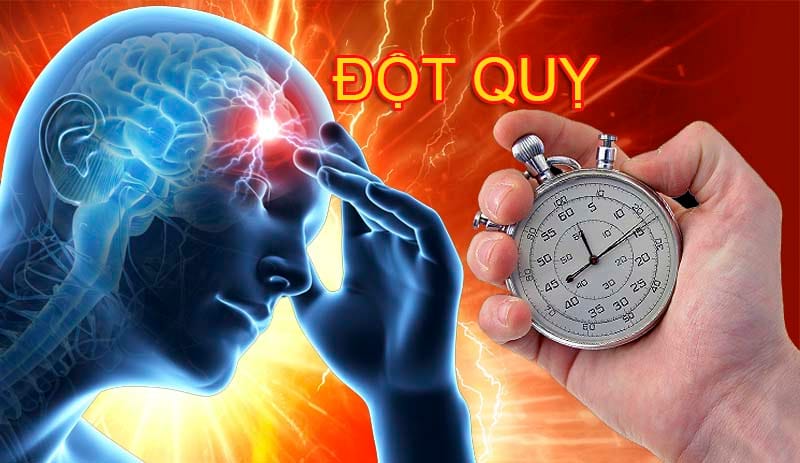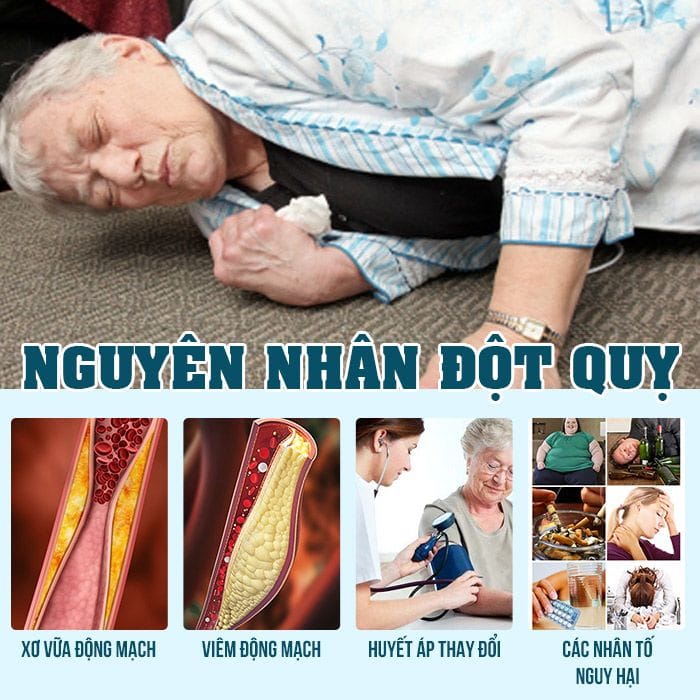In old age, the causes of stroke seem to be the top concern of everyone because of its extremely dangerous nature and threat to human life at any time. So what is the "silent enemy" behind this disease? Here are some unexpected causes.
Information about the causes of stroke that you should know
Stroke (cerebrovascular accident) is a condition in which the brain is damaged due to lack of blood or blockage of blood vessels, causing blood to not be able to circulate to supply oxygen to the brain. Over time, the blood flow is interrupted, unintentionally causing brain cells to gradually die due to lack of oxygen and nutrients. From there, leading to causes of stroke accompanied by one of the following signs: facial distortion, numbness in the limbs, difficulty speaking, decreased vision, severe headache. If not examined and treated promptly, it will lead to the risk of disability or even death.

Accordingly, there are 2 types of stroke including:
• Ischemic stroke: Stroke usually occurs when a blood vessel in the brain is blocked, accounting for about 80-85% of stroke cases.
• Hemorrhagic stroke: When a blood vessel in the brain ruptures, causing blood to leak into surrounding brain tissue, this is the cause of this stroke.
Causes of stroke in the elderly
Due to the decline in organ function and the increase in underlying diseases, the elderly are often at very high risk of stroke. Specifically, some common causes include:

• High blood pressure:
This is one of the diseases that the elderly often encounter due to the decline in function of the heart, blood vessels and also leading cause of strokeThe reason is that, once blood pressure increases, it also means that the pressure on the blood vessel walls increases, easily leading to blood vessel rupture, even forming blood clots which are very dangerous for the elderly.
• Atherosclerosis:
In the elderly, the accumulation of fat, cholesterol and other waste products over time leads to the formation of plaque on the walls of blood vessels, causing atherosclerosis. This will cause the lumen of the blood vessels to narrow, obstructing blood flow to the brain, leading to ischemic stroke.
• Cardiovascular disease:
Cardiovascular diseases such as heart failure, atrial fibrillation, and myocardial infarction are also factors that lead to stroke. Because when the heart rhythm is disturbed, blood clots will form, move from the heart to the brain and cause cerebral vascular occlusion.
• Diabetes:
People with diabetes are also at increased risk of atherosclerosis, which can damage small blood vessels, making it difficult to supply blood to organs, including the brain, thereby increasing the risk of stroke.
• High cholesterol:
Because aging slows down the body's metabolism, older people often have high cholesterol levels, leading to a buildup of cholesterol in the blood. And high blood cholesterol levels, especially LDL cholesterol (the "bad" cholesterol), can cause atherosclerosis, which can lead to stroke.
• Overweight and obesity:
In fact, diseases that can lead to stroke such as diabetes, high blood pressure, or cardiovascular diseases all originate from an overweight or obese body. Therefore, overweight elderly people often tend to have strokes due to related underlying diseases.
• Sedentary:
Also because of old age, health declines, so the elderly will be much less active than young people. This also affects blood circulation, creating conditions for fat to accumulate and develop, thereby increasing the risk of blood clots, causing blockage of cerebral blood vessels and leading to the risk of stroke.
• Smoking and drinking alcohol:
Everyone knows that smoking and drinking alcohol regularly will harm the liver and lungs, but few people know that this action also contributes to increasing the risk of atherosclerosis as well as high blood pressure. Because cigarettes can damage blood vessels, while alcohol reduces the efficiency of the heart. All of this creates opportunities for stroke to easily "visit".
• Genetic factors:
If there is a family history of stroke or cardiovascular disease, this can also increase the risk for older family members.
How to prevent stroke for the elderly
Here are some measures that can reduce the risk of stroke in the elderly that you can refer to:

• Blood pressure control:
Regularly monitoring blood pressure and maintaining a stable blood pressure below 120/80 mmHg will help reduce the risk of stroke. In addition, the elderly should also follow the doctor's instructions on medication use as well as adjust their diet to the most appropriate level.
• Blood sugar management:
For people with diabetes, managing blood sugar levels is important to reduce the risk of stroke. At this time, patients need to adjust their diet, exercise regularly, check their blood sugar periodically, and follow their doctor's treatment regimen.
• Reduce cholesterol:
Instead of consuming too much saturated fat and cholesterol, the elderly should eat more vegetables and fruits and prioritize choosing low-fat protein sources. Some foods that can help reduce bad cholesterol such as fatty fish, olive oil, nuts, cereals, etc., the elderly can add to their nutritional menu.
• Increase physical activity:
Although regular exercise is not easy for the elderly. However, gentle activities such as yoga, walking or swimming, the elderly can participate in under the supervision of a medical professional to improve blood circulation, reduce excess fat and regulate blood pressure.
• Quit smoking and limit alcohol:
These are two risk factors for stroke, so limit alcohol and quit smoking now to reduce high blood pressure and the risk of atherosclerosis.
• Regular health check-ups:
Regular health check-ups are an important preventive measure to help detect and treat early diseases such as diabetes, high blood pressure, heart disease, contributing to reducing the risk of stroke in the elderly.
• Avoid stress:
Stress and prolonged tension can increase blood pressure, affect cardiovascular health, and lead to the risk of stroke. To reduce this condition, the elderly can practice relaxation techniques such as meditation, deep breathing, or participate in light recreational activities.
Seek professional care
Although the above are some ways for the elderly to prevent the risk of stroke. However, not everyone has the time and knows how to apply them properly and scientifically. Therefore, seeking professional care and nursing services is necessary for the elderly to have time for work and life but still feel secure when their loved ones are always properly cared for from nutrition, exercise to health monitoring and regular updates.

Hopefully the above information will help you gain more knowledge about stroke, from the causes to early signs of this disease. Note that you need to take timely intervention measures right now to partly push back the risk of stroke "visiting" and improve the quality of life better.




